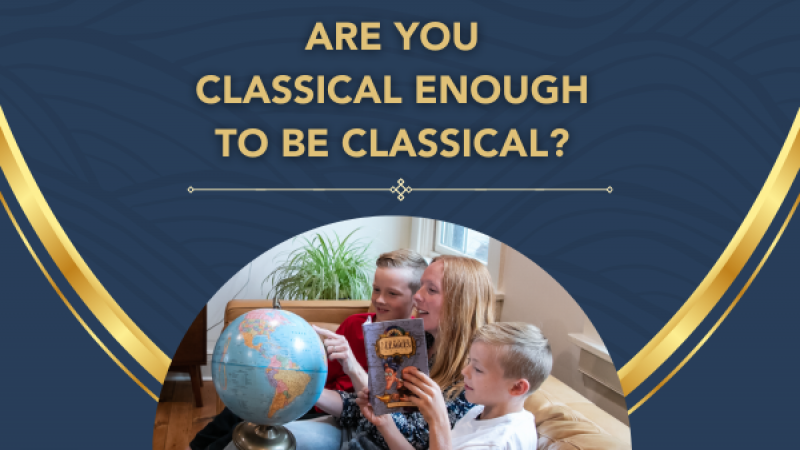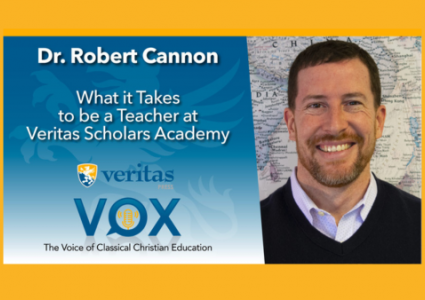Are You "Classical Enough" to Be Classical?

What exactly is the point at which an education counts as "classical"? Some answer the question in terms of the methods that are used. Others point to the curriculum. This post aims to address this important question by examining both methods and curriculum and then pointing beyond them to a third answer that deals with the goals of education.
Classical Education as a Method
When the resurgence of classical Christian education began in the 1990s, Dorothy Sayers's essay “The Lost Tools of Learning” was one of the chief catalysts for those who started mining for and implementing classical Christian education. As has been recently and persuasively argued by scholars like Dr. Chris Schlect, Dr. David Diener, and Dr. Andrew Selby, Sayers was not trying to describe classical Christian education in absolute terms. She was, winsomely, hoping to interest someone (nay, anyone) in moving back toward the old ways—ways being bulldozed in her days. We can all be thankful that her fascinating essay, which near its end, laments that no one will have the courage to make the dry bones of classical education into the hands of an Evangelical Pastor in Idaho who said, “Why not?”
Sayers's essay focuses on method—at some points, almost exclusively on pedagogy. She keenly recognizes some of the things educators in the Middle Ages witnessed. First, young children soak up knowledge like a sponge. She also saw that Middle Schoolers are argumentative. (I am not sure this is much of an insight! I recall one 8th or 9th grader complaining, “I hate how everyone thinks we hate everything!” Res ipsa loquitur: The thing itself says it.) Finally, she said high school students want to be themselves by fitting in, or, in less snarky jargon, they want others to see them as the adults many of them are becoming. She noted how the teacher should capitalize on the growing student's desires or giftings. So far, so good.
But is classical Christian education all about the method we use? Of course, not. I am particularly indebted to Dr. Diener for pointing this out in a recent talk. He said something like this: if your local public school starts doing Shurley Grammar jingles, the memory work in math, and arguing in middle school, have they become a classical school? We should call this principle the Diener Doctrine: if a public school would do this, would it make them a classical Christian school? The answer is: of course not! They could use these methods to evil ends. That is precisely what they sometimes do. In grammar school, they soak up gender and social justice claptrap. In the middle grades, they could use logic to make the best arguments against the Christian faith, and in high school, they could write poems praising pediatric gender-affirming surgery. This tactic could make you more classical if it is only about the method. In the end, we are not “method” only.
This post is not an attempt to cast aspersions at Sayers or say that the methods she recommends aren’t effective. They are. They alone, however, will not ensure classical Christian education.
Classical Christian Education as Curriculum
Others, back in the early days of classical Christian education (I was more on this side of the debate), argued that classical Christian education was more about subjects or curriculum rather than method. This pro-curriculum affinity seems at odds with Sayers, but it is more consistent with how classical Christian education flourished over the years. Sayers’s essay could imply that you could talk about anything or nothing or whether rain fell on, over, around, or above the baseball field. That is not curriculum-specific at all, but, of course, if you go back to the Middle Ages and ask an educator if you could be an educated person without reading the Bible, Plato, Aristotle, and Thucydides, I think you would receive something like a baffled, confused stare.
If we apply the Diener Doctrine, the curriculum also fails. If your local public school started using the Phonics Museum, Saxon Math, and reading the Great Books, would they be classical? They fail miserably.
Making these changes to the school’s curriculum would often be an improvement over the current whole-language, Common Core Math, and the current identity-politics-balanced reading list. Still, curriculum can’t make you classical.
So, If It's Not Method Nor Curriculum, What Makes Education Classical?
It all starts at the beginning with the objective or the end that you, as an educator, need to consider. Classical Christian education needs to have classical Christian aims. Let’s start with the Christian part because it is perhaps easier to see. If you are an authentically Christian school or homeschooler, you need to prayerfully aim at introducing students to Jesus, their only hope of salvation. You need to help them see their sin and need for forgiveness. You need to help them understand the love of God through the life, death, burial, and resurrection of Jesus. You need to help them understand the implications of a commitment to the Christ of the Bible—implications like loving God and others and living by God’s law. This obedience is not a path toward earning God’s favor; it is the kind of effort an obedient son makes to please his father because he loves him.
The same applies to the “classical” part of classical Christian education. Classical education aims to prepare children to be free, mature adults and full participants in a free society. The medievals believed that possessing the Seven Liberal Arts (Grammar, Logic, Rhetoric, Arithmetic, Geometry, Music, and Astronomy) was what every person needed to be free. As Christians took over Western education, they accepted the Liberal Arts but made them bow their metaphorical knees to Jesus. Instead of being means unto themselves or means to power, these arts became powerful tools to shape young students and to prepare them for whatever God called them to do.
Before I conclude, let me add one caveat to head off one possible misreading of this post. This essay does not assert that pedagogy (method) or curriculum are unimportant or that every method or curriculum is equal. Methods are important, and some curricula better fit classical Christian aims than other curricula. Recognizing that method and curriculum are servants to ends and objectives is critical to free both to have their greatest positive effect. Having ends in mind also helps us make judgments about methods and curriculum. These objectives allow us to ascertain whether a particular method or curriculum serves the ends of a classical Christian education.
Classical Christian education can not be purchased nor achieved by following three simple steps, ten principles, or whatever eye-catching marketing tactic someone comes up with next week. Classical Christian education is an act of repentance in which believing fathers and mothers are renewing and regaining a vision of the massive, crucial work done prayerfully raising young men and women to know and love Jesus and to be well-prepared for whatever calling God provides.






